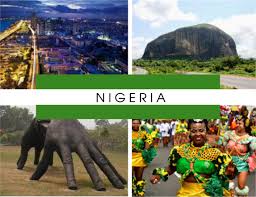Nigeria Tourism; Nigeria, often referred to as the “Giant of Africa,” is a country teeming with vibrant culture, diverse landscapes, and rich history. From bustling cities to serene natural wonders, Nigeria offers a myriad of attractions that cater to all kinds of travelers. Whether you’re an adventure seeker, history buff, or culture enthusiast, Nigeria has something special to offer.
The tourism industry is regulated by the Federal Ministry of Information and National Orientation (Nigeria). In an attempt to raise the profile of the country’s tourism sector, a beauty pagent, the MissFederal Ministry of Information and National Orientation (Nigeria) regulates the tourism industry Tourism Nigeria Pageant, was created in 2004. The 2004, 2005, and 2006 winners were Shirley Aghotse, Abigail Longe, and Gloria Zirigbe.
Click here to see a short video: https://www.youtube.com/watch?v=skdYTQ2pC9s
A challenge to the tourism industry in Nigeria is the death of accurate data which is cardinal in government decision-making. The Federal Office of Statistics (FOS) has not been able to collate travel data to develop and standardize travel research.
In 2017, Olufeko’s research in design and its intersections with anthropology, led to a journey inside Sungbo’s Eredo, bringing the rampart’s narrative back into social dialogue.
Attractions
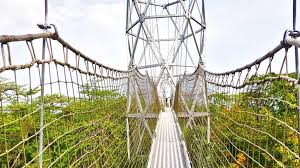
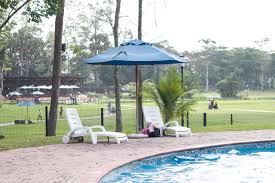
Lagos: The City that Never Sleeps
Lagos, Nigeria’s largest city, is a bustling metropolis known for its vibrant nightlife, beautiful beaches, and rich cultural scene. Key attractions include:
Victoria Island: Home to luxury hotels, restaurants, and shopping centers.
Lekki Conservation Centre: A serene nature reserve with a canopy walkway.
Nike Art Gallery: Showcasing Nigerian art and craftsmanship.
Abuja: The Modern Capital
Abuja, the capital city, is known for its modern architecture and well-planned layout. Key attractions include:
Aso Rock: A prominent rock formation offering scenic views.
Millennium Park: A large public park ideal for picnics and relaxation.
National Mosque and National Church: Architectural marvels symbolizing Nigeria’s religious diversity.
Calabar: The Cultural Haven
Calabar, located in the southeastern part of Nigeria, is famous for its rich history and cultural festivals. Key attractions include:
Obudu Mountain Resort: A stunning resort with breathtaking views and cool climate.
Calabar Carnival: Known as Africa’s biggest street party, held every December.
Slave History Museum: Offering insights into the region’s historical significance in the transatlantic slave trade.
Natural Wonders
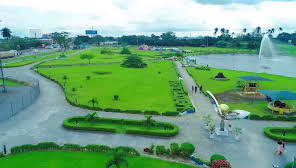
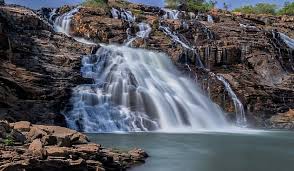
Yankari National Park
Located in Bauchi State, Yankari National Park is Nigeria’s most popular wildlife park. It offers opportunities for game viewing, bird watching, and exploring natural warm springs.
Olumo Rock
Situated in Abeokuta, Olumo Rock is a historical site and natural formation that provides panoramic views of the city. It has caves that were used as hideouts during ancient wars.
Ogbunike Caves
Located in Anambra State, the Ogbunike Caves are a UNESCO World Heritage Site with a network of tunnels and chambers rich in history and folklore.
Mambilla Plateau
In Taraba State, the Mambilla Plateau offers a temperate climate and stunning landscapes. It is ideal for hiking, bird watching, and experiencing the beauty of Nigeria’s highlands.
Urban Tourism
Lagos has become an important location for African and “black” cultural identity. Some of the festivals are Festac Food Fair held in Festac Town
Annually by Festaconline, Eyo Festival, Lagos Black Heritage Carnival, Lagos Carnival, Eko International Film Festival,
Lagos Seafood Festac Festival, LAGOS PHOTO Festival and the Lagos Jazz Series, which is a unique franchise for high-quality live music in all genres with a focus on jazz. Established in 2010, the popular event takes place over a 3–5 day period at selected high quality
outdoor venues. The music is as varied as the audience itself and features a diverse mix of musical genres from rhythm and blues to soul, Afrobeat, hip hop, bebop, and traditional jazz. The festivals provide entertainment of dance and song to add excitement to
travelers during a stay in Lagos.
Lagos has a number of sandy beaches by the Atlantic Ocean, including Elegushi Beach and Alpha Beach. Lagos also has a
number of private beach resorts including Inagbe Grand Beach Resort and several others in the outskirts.
Lagos has a variety of hotels ranging from three star to five star hotels, with a mixture of local hotels such as Eko Hotels and Suites,
Federal Palace Hotel and franchises of multinational chains such as Intercontinental Hotel, Sheraton and Four Points by Hilton.
Other places of interest include the Tafawa Balewa Square, Festac town, The Nike Art Gallery, Freedom Park, Lagos and the Cathedral Church of Christ, Lagos.
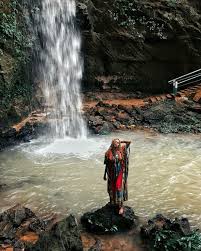
Resorts and Regional Tourism
Obudu Mountain Resort is a ranch and resort on the Obudu Plateau in Cross River State. It was developed in 1951 by M. McCaughley,
a Scot who first explored the mountain ranges in 1949. He camped on the mountaintop of the Oshie Ridge on the Sankwala Mountains
for a month before returning with Mr. Hugh Jones a fellow rancher in 1951. Together with Dr Crawfeild, they developed the Obudu Cattle Ranch. Although the ranch has been through troubles since, it has been rehabilitated to its former glory.
Since 2005, a cable car climbing 870 metres (2,850 ft) from the base to the top of the plateau gives visitors a scenic view
while bypassing the extremely winding road to the top. The resort is found on the Obudu Plateau, close to the Cameroon
border in the northeastern part of Cross River State, approximately 110 kilometres (68 mi) east of the town of Ogoja and 65 kilometres
(40 mi) from the town of Obudu in Obanliku Local Government Area of Cross River State.[8] It is about 30 minutes drive from
Obudu town and is about a 332 kilometres (206 mi) drive from Calabar, the Cross River State capital.
Also, Ibeno Beach is one of the most beautiful beaches in the country and the longest coastline sand beach in Nigeria and West Africa.
It is situated in Jamestown in Akwa Ibom. The city is said to be named after the local government where it is located. According
to historians, the beach is one of the oldest beaches in Nigeria.
Cultural Heritage
Nigeria is a melting pot of cultures, with over 250 ethnic groups. Each region offers unique cultural experiences:
Yoruba Land: Known for its vibrant festivals, traditional drumming, and dance.
Igbo Heartland: Famous for its intricate masquerades and traditional ceremonies.
Hausa-Fulani Region: Renowned for its rich history, traditional architecture, and festivals like Durbar.
Adventure and Outdoor Activities
For adventure enthusiasts, Nigeria offers various outdoor activities:
Surfing and Beach Activities: At beaches like Tarkwa Bay in Lagos.
Hiking and Trekking: In places like the Aso Rock and Obudu Mountain Resort.
Wildlife Safaris: In national parks like Yankari and Gashaka Gumti.
Practical Information
Best Time to Visit: The best time to visit Nigeria is during the dry season, from November to February, when the weather is cooler and more pleasant.
Travel Tips
Ensure you have the necessary vaccinations and travel insurance.
Respect local customs and traditions.
Use reputable tour operators and guides.
Stay updated on travel advisories and local regulations.
In Conclusion
Nigeria Tourism, with its dynamic cities, stunning natural landscapes, and rich cultural heritage, offers a unique and unforgettable travel experience. Whether you’re exploring the modern streets of Lagos, delving into the historical depths of Calabar, or marveling at the natural wonders of Yankari National Park, Nigeria promises an adventure like no other. Embark on a journey to the Giant of Africa and discover the magic that lies within its borders.
Read More: https://placesandlifestyle.com/the-millennium-park-abuja/

